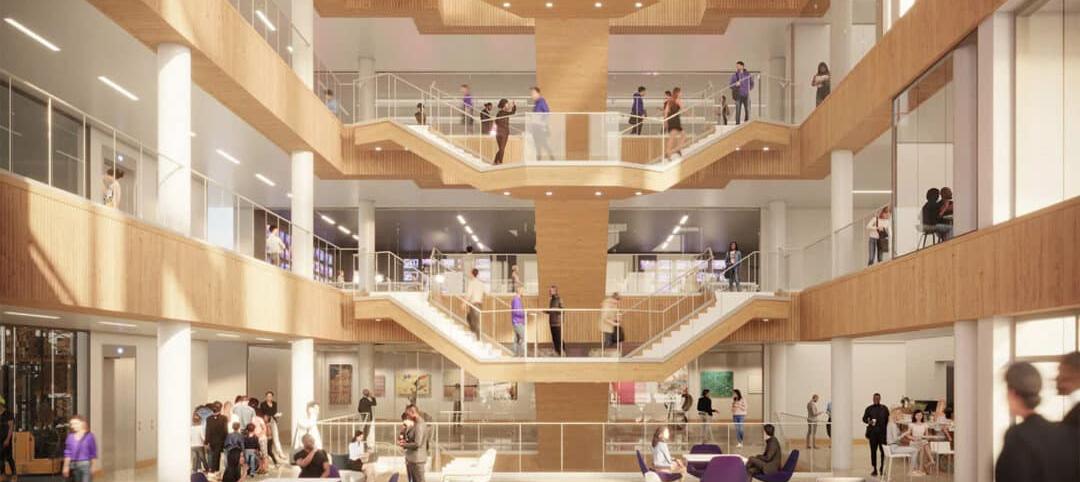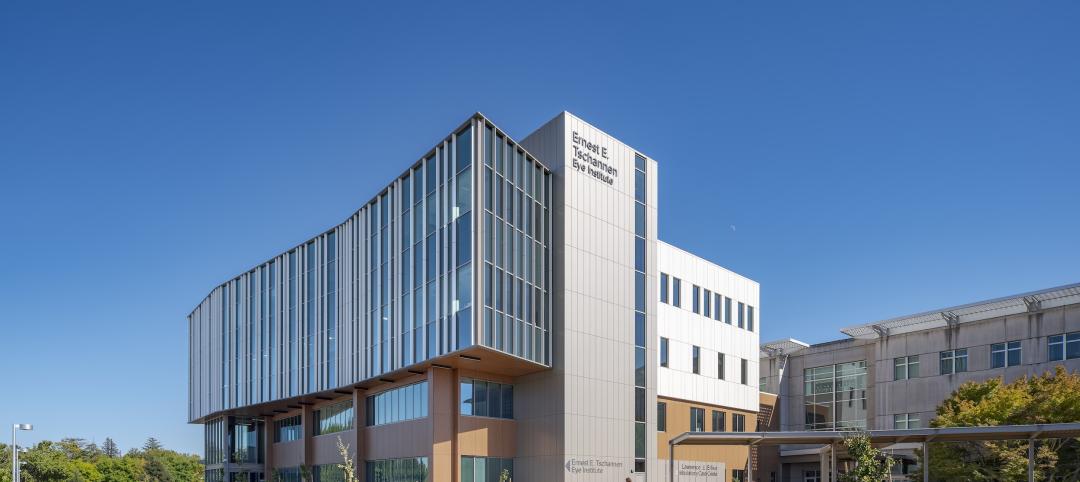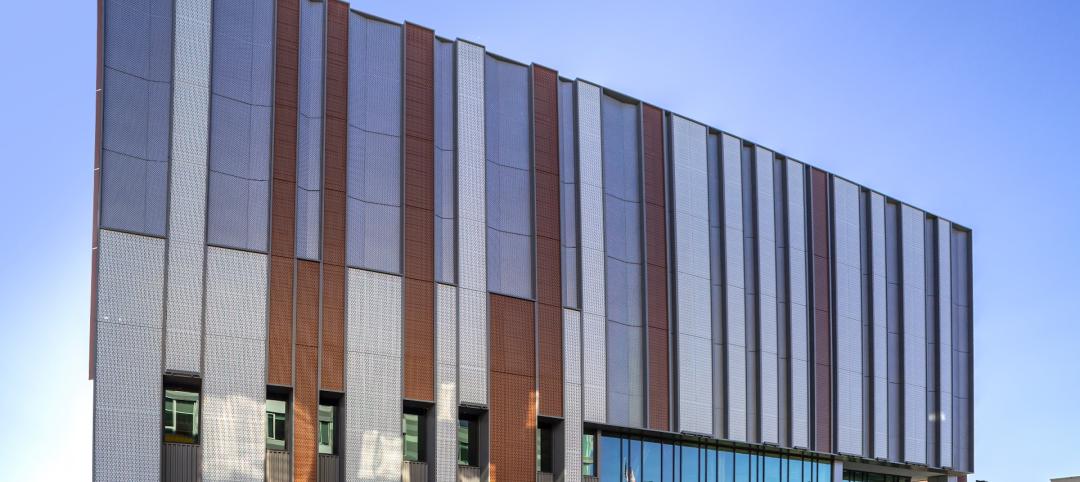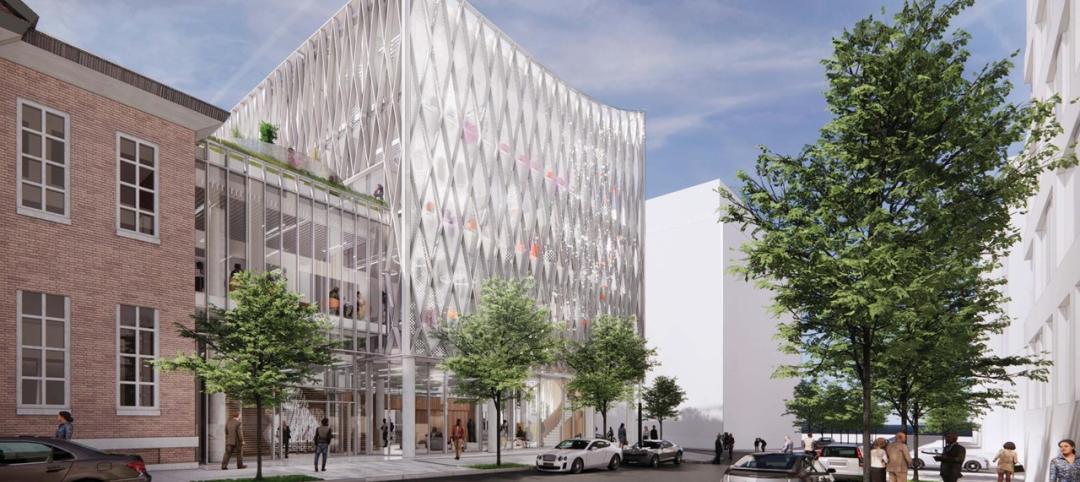The American Institute of Architects (AIA) Committee on Architecture for Education (CAE) has selected 12 projects for this year’s CAE Education Facility Design Awards. The program honors educational facilities that the jury believes should serve as an example of a superb place in which to learn, furthering the client's mission, goals, and educational program while demonstrating excellence in architectural design.
The 12 winners are listed below.
Henderson-Hopkins School; Baltimore
Rogers Partners
Associate Architect: Architects+Urban Designers
Award of Excellence
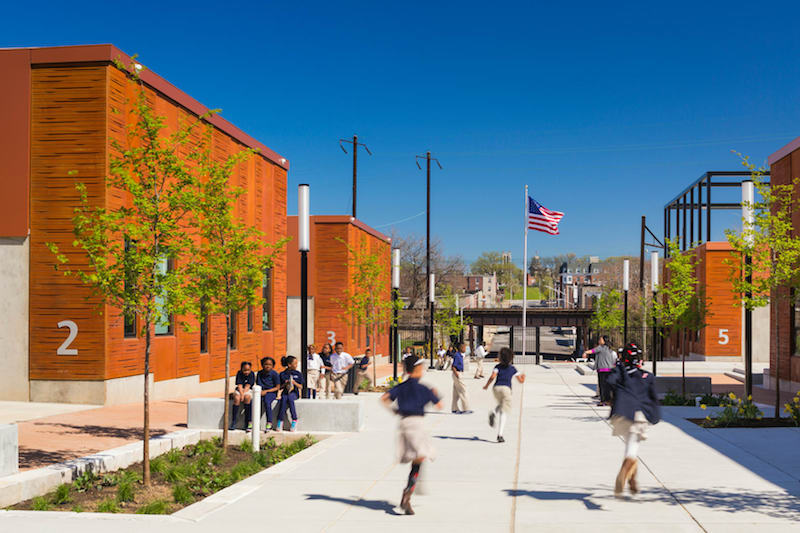
The Henderson-Hopkins School is the first new Baltimore public school in nearly 30 years. A 125,000-square-foot K-8 partnership school and early childhood center run by Johns Hopkins University, Henderson-Hopkins is a progressive learning environment for children and a laboratory for the next generation of educators.
The school is a cluster of “containers for learning” inspired by East Baltimore’s row houses, stoops, and social civic spaces. Through its intentionally porous, safe, urban plan, and the craftsmanship of light, materiality, and performance, its design respects history and supports the future of education and of its neighborhood.
Mundo Verde Bilingual Public Charter School; Washington, DC
Studio Twenty Seven Architecture
Award of Excellence
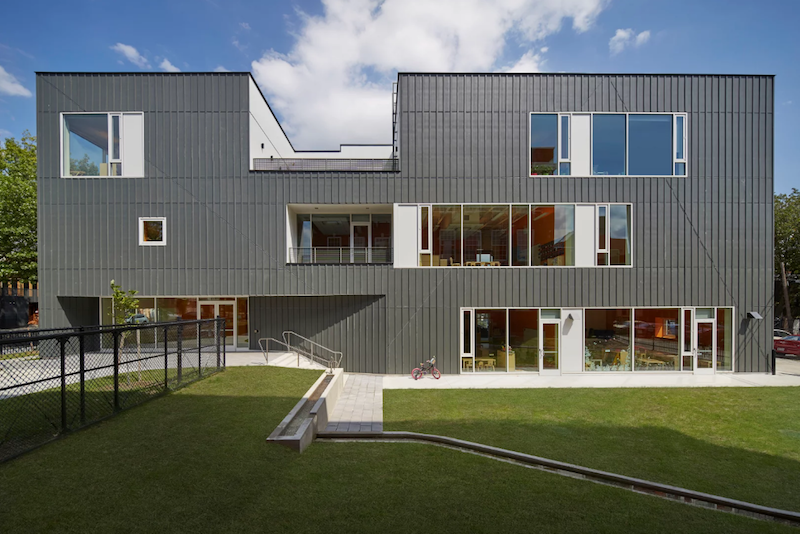
Mundo Verde is a bilingual, sustainability-focused public charter school located in the District of Columbia. The school’s curriculum is based on expeditionary learning, where students learn through the critical exploration of complex issues.
Awarded a shuttered 1920s-era school building and site by the District in 2013, Mundo Verde had a direct question for the design team: “How can this redevelopment and addition project teach our students to be global stewards?” From the renovation of the existing building to the precise detailing and material efficiency of the Pre-K annex, the entire campus is designed to foster learning through environmental living.
Regional Plant 2 Teaching Facility, Wake Technical Community College; Raleigh, N.C.
Clark Nexsen
Award of Excellence
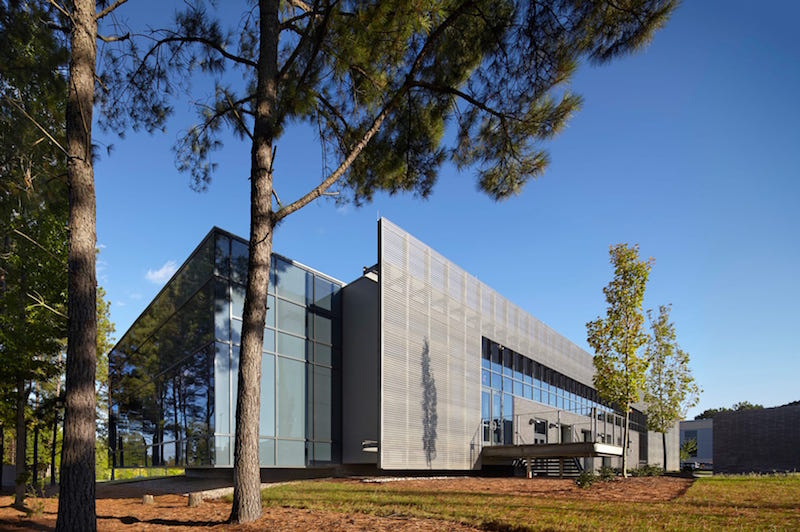
Located at the entrance of Wake Tech Community College on a wooded site, the Regional Plant Teaching Facility creates a gateway to the campus and symbolizes the merging of technology, education and sustainability.
Although the building’s program is composed of spaces to house heating and cooling equipment, it also serves as an educational facility for teaching students and the public about energy-efficient building systems. A simple rectilinear glass and steel box with a perforated metal screen layer houses, screens and displays the technology and creates a unique educational space for the college.
Regional Plant
Richard Ivey Building, Richard Ivey School of Business, Western University; London, Ontario, Canada
Hariri Pontarini Architects
Award of Excellence
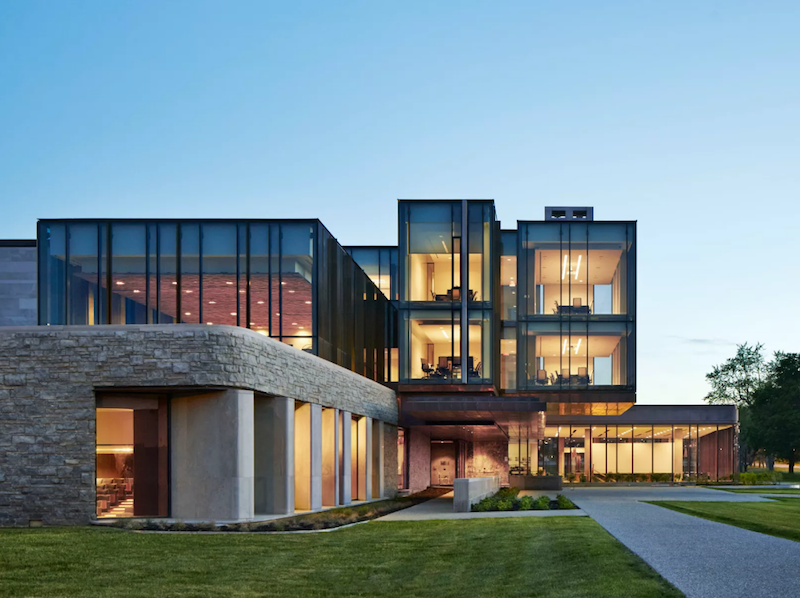
The vision for the Richard Ivey Building was creation of a vibrant, unified campus that would attract the best students and faculty, express the school’s global identity, and celebrate Western University itself.
Located on the western edge of the university’s campus at an active corner, the Richard Ivey Building is a beacon, a signifier of the school’s flagship status. Echoing the architecture of Western University's campus and the adjacent Brescia College, the solid masonry on the exterior conveys the traditional materiality of the University’s Gothic architecture, making it a modern building rooted in tradition.
Seton Hill Arts Center, Seton Hill University; Greensburg, Pa.
designLAB architects
Associate Architect: BSHM Architects
Award of Excellence
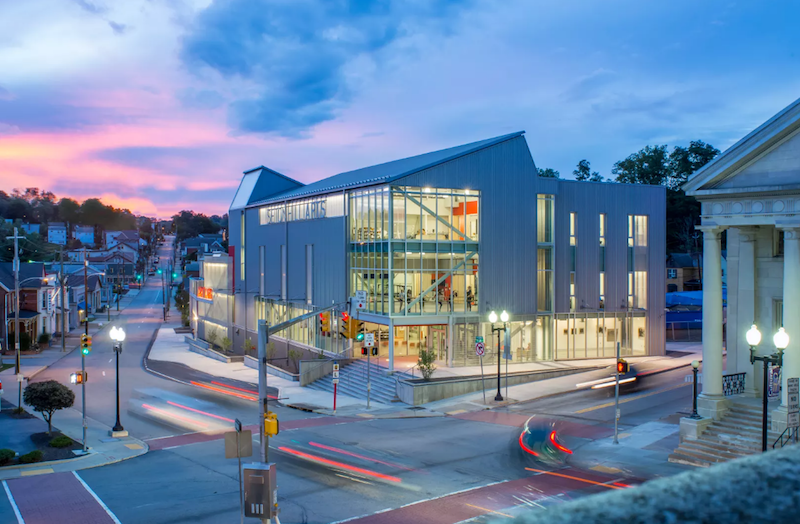
Seton Hill University’s new performing and visual arts facility is an interdisciplinary arts center that connects the local community with members of the university. Channeling the Pittsburgh area’s industrial heritage, the steel frame and metal-clad building was conceived as a “Factory for the Arts.” The project features an outdoor Arts Yard where the making of 3D arts is visible from the commercial Main Street in its host city of Greensburg, Pennsylvania.
The four-level facility features a full complement of studio spaces for traditional disciplines like painting, drawing, printmaking, sculpture, dance and theater, along with tech-heavy digital and graphic arts. The new building is an economic catalyst for the city’s cultural district, drawing local artists, gallery observers, and performing arts attendees to support and critique student work.
Vol Walker Hall Renovation & The Steven L. Anderson Design Center, University of Arkansas; Fayetteville, Ark.
Marlon Blackwell Architects
Associate Architect: Polk Stanley Wilcox Architects
Award of Excellence
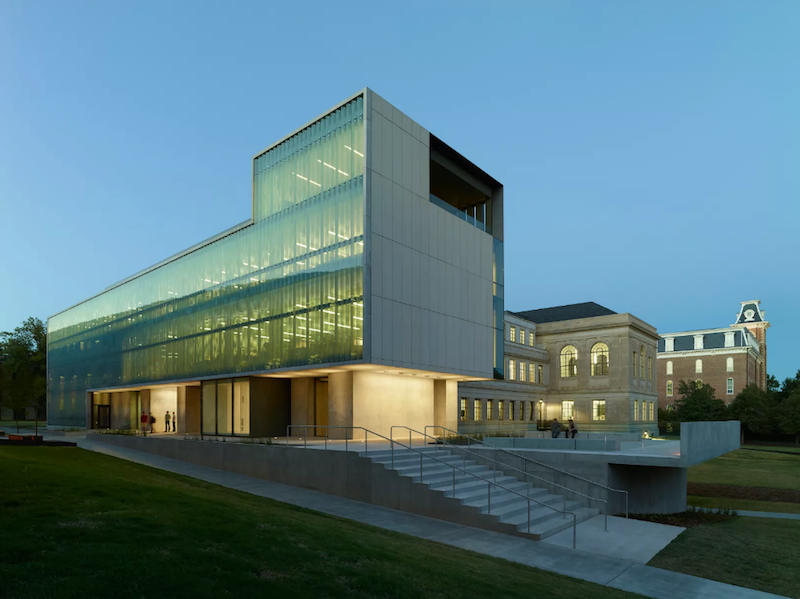
Vol Walker Hall and the addition of the Steven L. Anderson Design Center for the Fay Jones School of Architecture and Design at the University of Arkansas is a complex but resolute hybrid of a historic restoration and a contemporary insertion and expansion.
Post-tensioned concrete and Indiana limestone honor the weight and substance of the historic, while the west-facing fritted glass brise-soleil and steel curtainwall create a contemporary figure. The overall design is a didactic model, establishing a tangible discourse between past and present, while providing state of the art facilities for 21st century architectural and design education.
Dwight-Englewood School Hajjar STEM Center; Englewood, N.J.
Gensler
Award of Merit
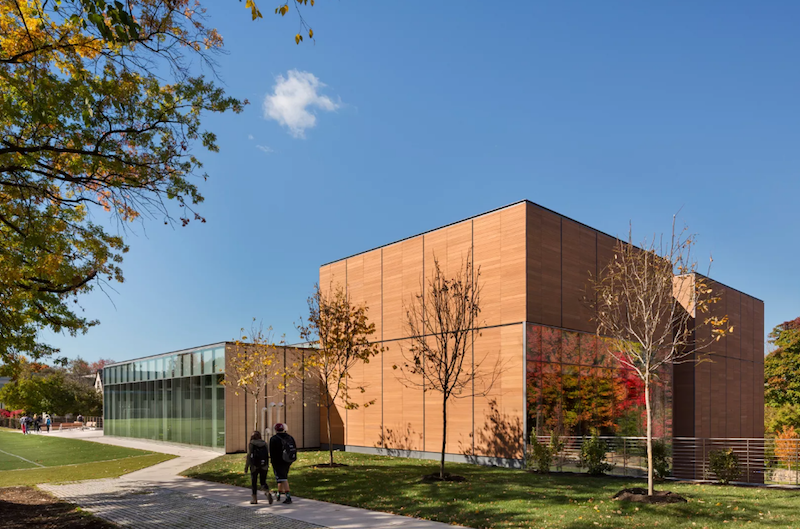
The new 28,000-square-foot building at the Dwight-Englewood School, an independent day school for PK-12, is the realization of a multi-year exploration and visioning process. It is also the embodiment of the school’s mission and growing STEM (science, technology, engineering, math) curriculum.
The technically innovative, highly sustainable, programmatically energized, and contextually sensitive solution equals an expanded campus that seeks to unify Dwight-Englewood's community of faculty, students, and administration and create a center of excellence around this ever-important pedagogy.
Fayetteville High School Addition and Renovation; Fayetteville, Ark.
Hight Jackson Associates
Associate Architect: DLR Group and Marlon Blackwell Architects
Award of Merit
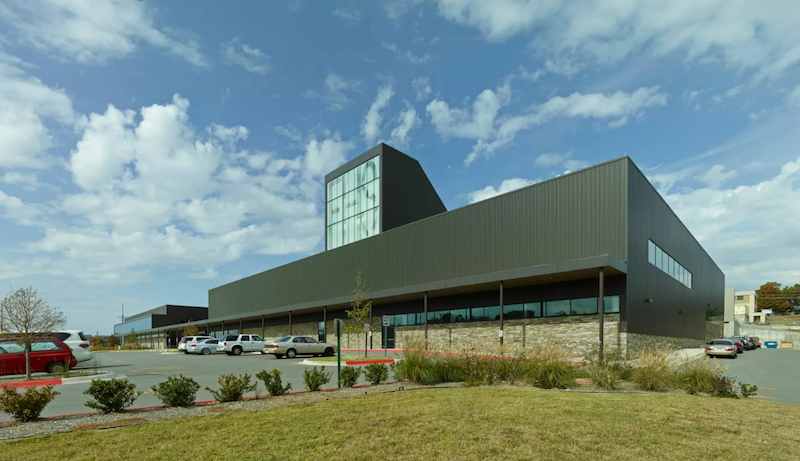
To maintain its competitive advantage in academics, Fayetteville Public Schools tasked the design team to strategically restructure its high school education program into a small learning community (SLC) model. At more than 500,000 square feet, this project is the largest civic project in Fayetteville over the past 50 years. It constitutes an addition and a massive modernization of aged buildings through a 36-month phased approach, allowing for continuous operation of the school during construction.
Fayetteville High School features greatly simplified circulation and improved security around a public entry plaza and a pedestrian green street that mediates between the first and second phase and the 85-foot change in topography across the site. SLCs are designed with core learning studios that feature discovery, project-based learning, digital and applied learning labs to foster collaboration. Distributed administration, resource centers and dining allow students to spend a majority of their day within their SLC. The addition features abundant glass and overlooks a new landscaped street that creates a collegiate campus feel reflective of the school's ties to the University of Arkansas.
GateWay Community College Integrated Education Building; Phoenix
SmithGroupJJR
Award of Merit
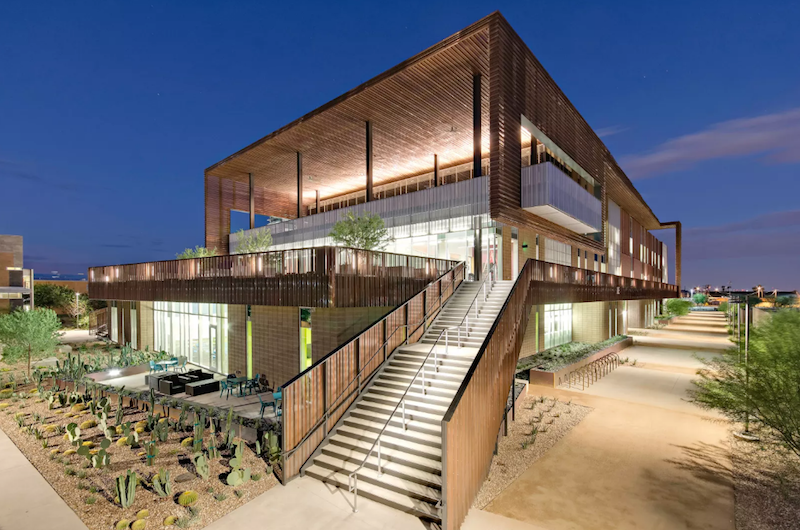
GateWay Community College, located centrally in the metropolitan Phoenix area, has created a new all-in-one 122,000-gross-square-foot facility for their urban campus. The Integrated Education Building (IEB) is centrally located on campus and meshes an entire new campus of functions into a single three-story structure.
The IEB provides a new student services center, learning center and community library, instructional labs, classrooms, faculty offices and a large community-oriented 200-seat multi-purpose room. The project both transforms the campus and provides metamorphic momentum for a historically blighted and under-valued part of the city.
Harvard Business School, Tata Hall; Boston
William Rawn Associates, Architects, Inc.
Award of Merit

Sited on the banks of the Charles River, Tata Hall at Harvard Business School creates a porous edge to the campus and a new sense of openness between the school and the city of Boston. Dedicated to the Executive Education program, the building groups students into clusters of eight-person suites, each with a common space for work, collaboration and presentations.
Indian Springs School; Birmingham, Ala.
Lake|Flato Architects
Associate Architect: Architecture Works
Award of Merit
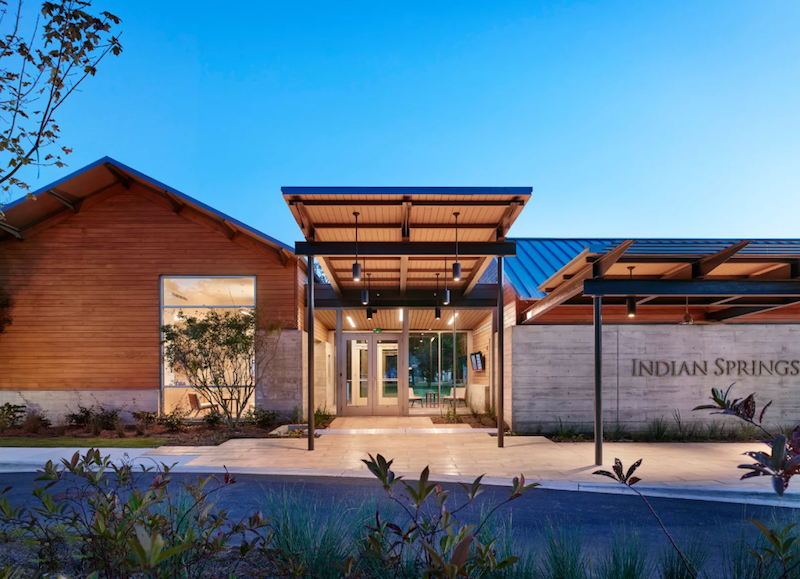
Founded in 1952 on the motto, “Learning Through Living,” Indian Springs School is a place of exceptional people and purpose. The 350-acre boarding and day school campus, originally planned by the Olmstead Brothers, was functional and serviceable but aging facilities were inhibiting the growth of educational programs and opportunities.
This first phase of a comprehensive master plan includes new academic and administrative buildings and complementary landscapes that create a memorable, meaningful place. The new academic heart of the campus recalls its original vision with a contemporary overlay of teaching methodology, technology, aesthetics and performance that make a unique learning environment—Springsian in every way.
Kennedy Child Study Center; East Harlem, N.Y.
Pell Overton Architects
Award of Merit
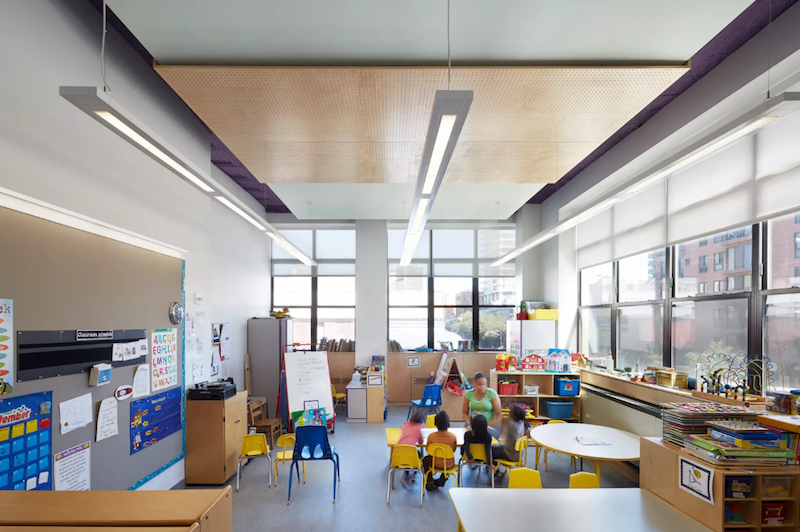
Last summer, the 165-family Kennedy Child Study Center relocated to a new home in East Harlem, occupying two floors of a previously un-renovated 1930’s warehouse building. The adaptive reuse of the 25,000-square-foot space presented a number of difficult challenges, including an unusually low ceiling and absence of any natural light.
Consequently, the design of the 16-classroom facility developed around the need to radically transform the existing warehouse into a varied space for learning and engagement, creating a sense of both openness to the surrounding community and continuity between the neighborhood and the individual classroom environments.
The jury for the 2016 Educational Facility Design Awards includes: Karina Ruiz, AIA (Chair), DOWA-IBI Group Architects; Christina Alvarez, Delaware Design Lab HS; Helena L. Jubany, FAIA, NAC/Architecture; Bruce Lindsey, AIA, Washington University in St. Louis; Zachary Neubauer, University of Portland and Steve Ziger, AIA, Ziger/Snead Architects.
See the full release here.
Related Stories
Architects | Apr 6, 2023
New tool from Perkins&Will will make public health data more accessible to designers and architects
Called PRECEDE, the dashboard is an open-source tool developed by Perkins&Will that draws on federal data to identify and assess community health priorities within the U.S. by location. The firm was recently awarded a $30,000 ASID Foundation Grant to enhance the tool.
Architects | Apr 6, 2023
Design for belonging: An introduction to inclusive design
The foundation of modern, formalized inclusive design can be traced back to the Americans with Disabilities Act (ADA) in 1990. The movement has developed beyond the simple rules outlined by ADA regulations resulting in features like mothers’ rooms, prayer rooms, and inclusive restrooms.
Sustainability | Apr 4, 2023
NIBS report: Decarbonizing the U.S. building sector will require massive, coordinated effort
Decarbonizing the building sector will require a massive, strategic, and coordinated effort by the public and private sectors, according to a report by the National Institute of Building Sciences (NIBS).
Education Facilities | Apr 3, 2023
Oklahoma’s Francis Tuttle Technology Center opens academic center for affordable education and training
Oklahoma’s Francis Tuttle Technology Center, which provides career-specific training to adults and high school students, has completed its Francis Tuttle Danforth Campus—a two-story, 155,000-sf academic building. The project aims to fill the growing community’s rising demand for affordable education and training.
Sports and Recreational Facilities | Mar 30, 2023
New University of St. Thomas sports arena will support school's move to Division I athletics
The University of St. Thomas in Saint Paul, Minn., last year became the first Division III institution in the modern NCAA to transition directly to Division I. Plans for a new multipurpose sports arena on campus will support that move.
Healthcare Facilities | Mar 26, 2023
UC Davis Health opens new eye institute building for eye care, research, and training
UC Davis Health recently marked the opening of the new Ernest E. Tschannen Eye Institute Building and the expansion of the Ambulatory Care Center (ACC). Located in Sacramento, Calif., the Eye Center provides eye care, vision research, and training for specialists and investigators. With the new building, the Eye Center’s vision scientists can increase capacity for clinical trials by 50%.
Sponsored | Cladding and Facade Systems | Mar 15, 2023
Metal cladding trends and innovations
Metal cladding is on a growth trajectory globally. This is reflected in rising demand for rainscreen cladding and architectural metal coatings. This course covers the latest trends and innovations in the metal cladding market.
Education Facilities | Mar 15, 2023
DLR Group’s Campus Planning Studio defines new leadership
Linsey Graff named Campus Planning Leader. Krisan Osterby transitions to Senior Planner.
Student Housing | Mar 13, 2023
University of Oklahoma, Missouri S&T add storm-safe spaces in student housing buildings for tornado protection
More universities are incorporating reinforced rooms in student housing designs to provide an extra layer of protection for students. Storm shelters have been included in recent KWK Architects-designed university projects in the Great Plains where there is a high incidence of tornadoes. Projects include Headington and Dunham Residential Colleges at the University of Oklahoma and the University Commons residential complex at Missouri S&T.
University Buildings | Feb 23, 2023
Johns Hopkins shares design for new medical campus building named in honor of Henrietta Lacks
In November, Johns Hopkins University and Johns Hopkins Medicine shared the initial design plans for a campus building project named in honor of Henrietta Lacks, the Baltimore County woman whose cells have advanced medicine around the world. Diagnosed with cervical cancer, Lacks, an African-American mother of five, sought treatment at the Johns Hopkins Hospital in the early 1950s. Named HeLa cells, the cell line that began with Lacks has contributed to numerous medical breakthroughs.




